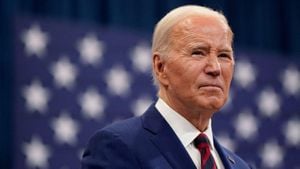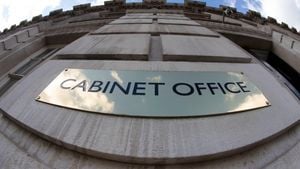The New Zealand government is poised to announce significant revisions to its Active Investor Plus Visa program, commonly referred to as the golden visa, as part of efforts to attract wealthy migrants back to the country's shores. Recent data reveals the program, which was once heralded for bringing substantial foreign investment—averaging around NZ$1 billion (approximately US$580 million) annually—has experienced a sharp decline, slashing investment levels to just NZ$176 million per year. This translates to an alarming 82.4% drop, raising concerns among policymakers about the viability of the program as it currently stands.
Finance Minister Nicola Willis disclosed these forthcoming changes during recent interviews, emphasizing the fiscal impetus driving the revisions. She explained to Bloomberg reporters, "We are conscious of the last government's changes to the visa settings, which resulted in a notable downturn in the number of investors." The shift has not gone unnoticed; just 35 applications have received approval over the past two years, totaling roughly NZ$352 million of intended investments, indicative of the program's waning allure among potential foreign investors.
The morose state of the Active Investor Plus Visa reflects recent reforms initially introduced back in 2022. Under the new guidelines, applicants have been required to commit to direct investments of at least NZ$5 million, with even steeper requirements for passive investments pegged at NZ$15 million. Previously, the entry threshold had been marked at NZ$3 million, inclusive of bonds and property investments—options which have since been dropped from eligibility. This shift appears to have created barriers for potential investors who found the previous criteria more accessible.
Minister Willis sheds light on the new government's direction, stating there would be legislation to spotlight the importance of foreign capital as New Zealand seeks to bolster its economic prospects. She remarked, "Investor migrants contribute more than just their finances; they bring skills, networks, and investment opportunities. Their initial stakes often lead to more significant engagements across various sectors, which are invaluable for our economy." This perspective indicates an intentional pivot toward enhancing the multifaceted benefits tied to attracting foreign investors.
Earlier, the Active Investor Plus Visa program flourished as New Zealand positioned itself as appealingly stable—ideal for investors seeking peace, safety, and access to high-quality education and healthcare. Unlike many jurisdictions, New Zealand had previously attracted hefty investments through its golden visa, capitalizing on its reputation for safety and attractive living conditions. Yet, with the changing dynamics of global migration trends and investor preferences, the nation finds itself needing to adapt.
The upcoming announcements signal the centre-right government's recognition of these shifts. Officials plan to streamline processes related to overseas investment applications, aiming for greater efficiency and appeal as they recalibrate the investment thresholds and define the strategic objectives of the country more clearly.
Willis affirms, "You can expect announcements from us on these matters soon," reassuring stakeholders of the government's proactive stance on rejuvenation efforts aimed at reinstigated vibrancy within the investment sector. She believes fostering welcoming conditions for foreign capital is pivotal for economic growth, addressing potential fears about increased scrutiny surrounding recent immigration flows.
Critics have raised concerns about how current visa rules restrict the types of investments eligible under the program. The exclusion of historically favored options such as property and bond investments may serve as deterrents for potential investors accustomed to flexibility. Meanwhile, experts argue the demand for urban residential properties, increasingly under pressure from various housing shortages, could be compelling enough for the New Zealand government to revisit and revise these restrictions if they are serious about economic recovery through migration.
A revival of the golden visa program could reignite investor interest, drawing attention from international high-net-worth individuals seeking softer entry points to not only live but contribute to the economy. Any changes announced may soon resonate across various sectors, including real estate, hospitality, and services, as foreign investors often engage meaningfully with the local markets and communities.
New Zealand's efforts now pivot on the potential realignment of the Active Investor Plus Visa program, adapting to the changing tides of global investment migration by perhaps offering innovative paths or decreasing the barriers to entry. How effectively the country can balance attracting necessary capital with ensuring it aligns with the broader goals of community engagement and economic resilience remains to be seen. The upcoming weeks will undoubtedly be pivotal as expectations run high on what the future holds for this once-vibrant investment migration gateway.



